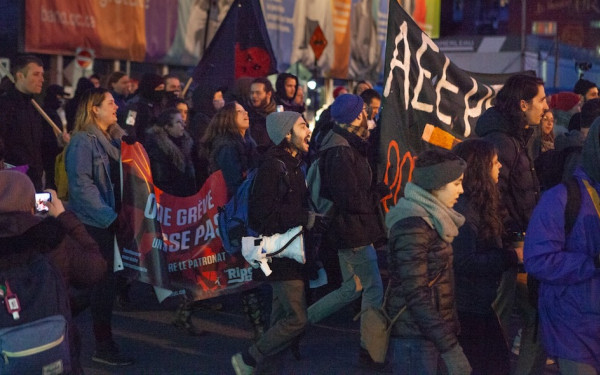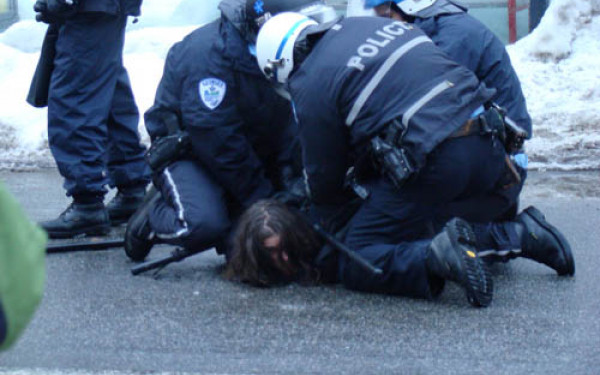Why We Sadly Shouldn’t March with Municipal Workers on Sept. 20
The Coalition syndicale pour le droit à la libre négociation is planning a massive demonstration against Bill 3 on Saturday, Sept. 20.
If passed by Quebec’s National Assembly, the bill would harm the pension plans of workers employed by municipalities across the province—in many cases retroactively and in contravention of signed agreements.
It might not be obvious at first glance, but these municipal workers are the natural allies of those of us who took to the streets during the 2012 student strike that ousted the previous Liberal government.
Pension plan reforms, tuition fee hikes, endless cuts to essential services—these are all hallmarks of the neoliberal ideology of austerity, which demands more and more from the middle and working classes in order to continue providing tax breaks and subsidies for the richest of the rich.
Sept. 20 represents a golden opportunity for students and others to march alongside workers in a formidable show of solidarity against austerity.
It’s a chance to continue the work we began during the strike and build the foundation of a powerful, province-wide anti-austerity alliance.
But as much as I want to write a call to arms, an appeal to join our comrades in the street with our red felt squares and our pots and pans, I don’t think I can.
The problem is not that municipal employees are paid too much or that I oppose their tactics.
In fact, I was surprised by the negative reaction some of us showed to their bonfire in front of Montreal’s city hall in June and their boisterous siege of the building last month.
This reaction, I think, was largely rooted in bitterness that we could never have pulled off such actions ourselves during the strike—and we can’t let bitterness be what motivates us.
The irony is that municipal employees have been condemned by elected officials and the media in much the same terms as we were.
They are unruly, lawless and even violent, according to the agenda-setters and newsmakers; their behavior is supposedly undemocratic and outside the realm of legitimate action.
The disastrous long-term effects of the neoliberal ideology are, of course, far more violent and undemocratic than any of our demonstrations.
Editor-in-Chief Brandon Johnston’s article “How To Protest (and How Not To)” in last week’s issue of The Link was informative and well intentioned, but I feel it’s patronizing to dictate to our allies how they should and shouldn’t mobilize for social justice.
In the case of our municipal employees, now is the time for us not to critique their tactics but to show solidarity in any way we can.
What we unfortunately can’t do, however, is join them in the street on Sept. 20 because of, well, the police.
The Service de police de la Ville de Montréal routinely intimidates, beats, sprays, gases and arrests en masse those who participate in demonstrations. But they will likely be attending the Sept. 20 demonstration as participants themselves.
After all, they too are municipal employees who will be affected by Bill 3. You may have noticed them wearing their camo pants and red caps in protest.
Gabriel Nadeau-Dubois, who served as co-spokesperson for the Coalition large de l’Association pour une solidarité syndicale étudiante during much of the student strike, somehow managed to eschew sarcasm in a letter to police officers that was published in La Presse in June.
The roles have changed since 2012, Nadeau-Dubois told them, and now it’s their turn to fight the same fight against austerity we did.
“Like many other young people who have social justice at heart, I am in solidarity with your mobilization,” wrote Nadeau-Dubois.
Meanwhile, Jason McLean admitted in an opinion piece for ForgetTheBox last month that he was torn between his support of the protests and his disdain for the police.
He proposed that “ASSÉ or another group on the SPVM hitlist organize a solidarity demo against [Premier] Couillard and Bill 3” as a kind of test.
“Best-case scenario, this ushers in a new solidarity where cops in future demos start ignoring their commanders and refuse to enforce bullshit laws against those who stood with them,” wrote McLean.
“No matter what happens, though, this would be a chance for activists to truly take the high road while flipping the script on those in power and their enforcers, if only for a bit.”
This idea does have its appeal: activists wearing red squares marching in solidarity with the police—who have suddenly taken a liking to the red square themselves—would surely confuse the heck out of them and leave Quebec’s power elite, so dependent on the age-old strategy of divide and conquer, shaking in their shoes.
A solidarity demo is one thing, but marching side-by-side with police is out of the question. On a strategic level, it would be naïve to expect this to “usher in a new solidarity.”
But more importantly, as a matter of principle, we absolutely can’t do it when we know what police have done to Guy Blouin in Quebec City; to Michael Brown in Ferguson, Missouri; to Eric Garner in New York City; to Fredy Villanueva right here in Montreal; and to countless others.
The cops who did these things are not just a few bad apples. By the responses of their colleagues, we know they are indicative of the entire institution.
After all, according to the defence attorney for one of the officers who beat Kelly Thomas to death in Fullerton, California, they were just doing their job, “what they were trained to do.”
Are the police even actually workers, or just a repressive, murderous mechanism of the state and corporate interests?
On a purely practical level, many of us who are survivors of police brutality ourselves are simply too frightened to even think about joining forces with our aggressors, even if it is supposed to be for the greater good.
For any profound change to take place, the cops will have to put down their weapons and join us. But it definitely has to be them that join us—whether by choice or by obligation—and not vice versa.
It has happened elsewhere and it will have to happen here. Hopefully, by at least becoming allies with their allies, we can speed this process along.
In the meantime, maybe the best thing we can do on Sept. 20 is instead join the Convergence des luttes anticapitalistes for their general assembly from 1 p.m. to 5 p.m.
It’ll be held at the Université du Québec à Montréal, with the exact location to be posted on the door of room J-M770. That might be a good place to talk about organizing a solidarity demonstration against austerity.
Solidarity with all workers. Solidarity with blue collars, white collars, firefighters and bus drivers! But sadly we can’t march with them as long as they march with the police.

_900_337_90.jpg)


01web_600_375_90_s_c1.jpg)


2_600_375_90_s_c1.jpg)